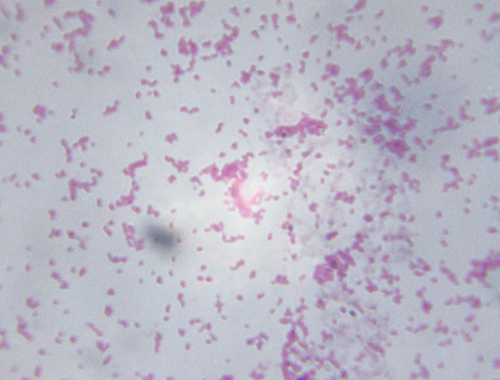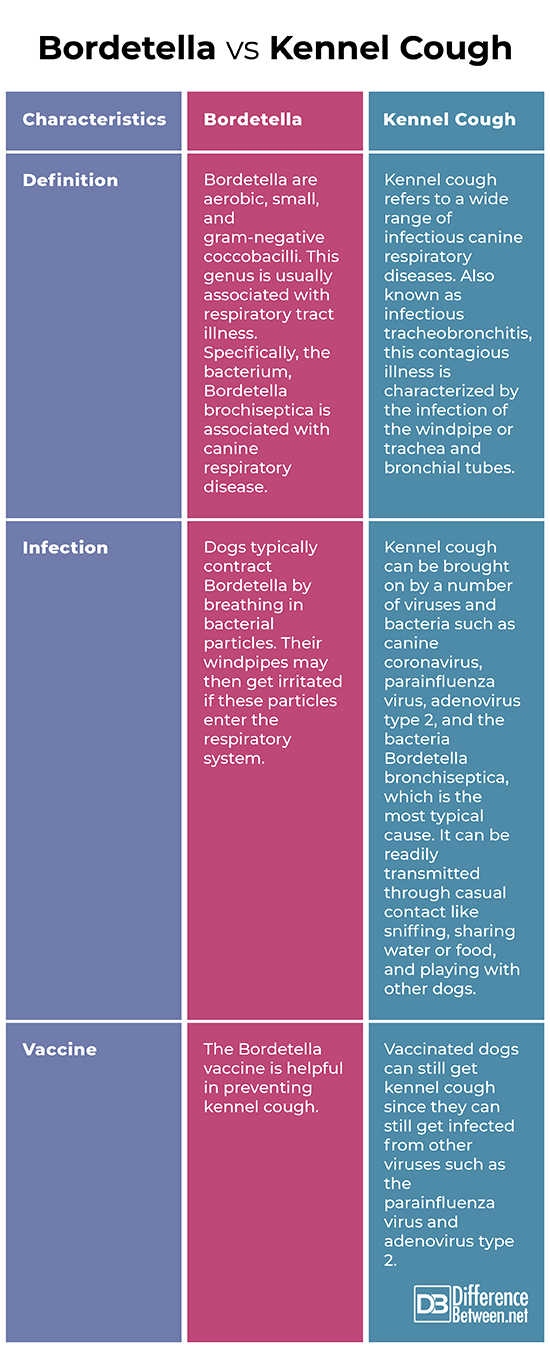Difference Between Bordetella and Kennel Cough
A number of sources cite Bordetella and kennel cough interchangeably. However, the bacterium, Bordetella brochiseptica is a common cause of canine respiratory disease while kennel cough refers to a wide range of infectious canine respiratory diseases. The following discussions further delve into their differences.

What is Bordetella?
Bordetella organisms are small, aerobic (require oxygen for survival), and gram-negative (do not retain the crystal violet stain) coccobacilli (shaped like ovals or short rods). This genus is usually associated with respiratory tract illness (Heininger, 2006). Specifically, the bacterium, Bordetella brochiseptica is associated with canine respiratory disease. Although it is uncommon, humans can get Bordetella bronchiseptica. However, the evidence that any human Bordetella cases were brought on by contact with an infected dog is somewhat weak and circumstantial (Prime VET, 2022).
Dogs typically contract Bordetella by breathing in bacterial particles. Their windpipes may then get irritated if these particles enter the respiratory system. The risk of being infected by Bordetella may be increased by certain situations such as poor ventilation, cold temperatures, dust or smoke exposure, and stress (Rancho Park, 2022).
The Bordetella vaccine is commonly given to dogs who often interact with other dogs in boarding or social settings. Many facilities catering to canines require that the dogs are immunized before they are allowed on the property. In general, healthy adult dogs who interact with big packs of other dogs should receive a booster dose of the Bordetella vaccine within the last six months (Burke, 2017).

What is Kennel Cough?
The phrase “kennel cough” is used to refer to a wide range of infectious canine respiratory diseases. Also known as infectious tracheobronchitis, this contagious illness is characterized by the infection of the windpipe or trachea and bronchial tubes. Given that the illness spreads when dogs live in close quarters, it frequently appears immediately after dogs have been in kennels, hence the name “kennel cough.” The Canine Infectious Respiratory Disease Complex (CIRDC) is another name for this disease because it can be brought on by a variety of viruses (Ward, 2022).
Symptoms
The most obvious indication that a dog has kennel cough is a distinctive honking cough, usually described as a “goose honk”. Most infected dogs cough during or after exercise, or when their throats are palpated or rubbed. The hacking cough often persists for several weeks. Other symptoms include runny nose and eyes, sneezing, and low-grade fever (American Kennel Club, 2022). Unfortunately, the majority of kennel cough symptoms overlap with those of canine distemper or viral canine influenza. Puppies and dogs with weakened immune systems are most vulnerable.
Causes
Kennel cough can be brought on by a number of viruses and bacteria (frequently at the same time) such as canine coronavirus, parainfluenza virus, adenovirus type 2, and the bacteria Bordetella bronchiseptica, which is the most typical cause. It can be readily transmitted through casual contact like sniffing, sharing water or food, and playing with other dogs.
Treatment
Despite being extremely contagious, kennel cough seldom results in death and is typically quite curable. It usually resolves within one to three weeks. Though there are no specific treatments for the viral infections, antibiotics are used against the bacterium, Bordetella bronchiseptica. Anti-inflammatory and cough suppressant medications may also provide relief (Ward, 2022).
Difference between Bordetella and Kennel Cough
Definition
Bordetella organisms are small, aerobic (require oxygen for survival), and gram-negative (do not retain the crystal violet stain) coccobacilli (shaped like ovals or short rods). This genus is usually associated with respiratory tract illness (Heininger, 2006). Specifically, the bacterium, Bordetella brochiseptica is associated with canine respiratory disease. Regarding kennel cough, it refers to a wide range of infectious canine respiratory diseases. Also known as infectious tracheobronchitis, this contagious illness is characterized by the infection of the windpipe or trachea and bronchial tubes. Given that the illness spreads when dogs live in close quarters, it frequently appears immediately after dogs have been in kennels, hence the name “kennel cough” (Ward, 2022).
Infection
Dogs typically contract Bordetella by breathing in bacterial particles. Their windpipes may then get irritated if these particles enter the respiratory system. The risk of being infected by Bordetella may be increased by certain situations such as poor ventilation, cold temperatures, dust or smoke exposure, and stress (Rancho Park, 2022). As for kennel cough, it can be brought on by a number of viruses and bacteria (frequently at the same time) such as canine coronavirus, parainfluenza virus, adenovirus type 2, and the bacteria Bordetella bronchiseptica, which is the most typical cause. It can be readily transmitted through casual contact like sniffing, sharing water or food, and playing with other dogs.
Vaccine
The Bordetella vaccine is commonly given to dogs who often interact with other dogs in boarding or social settings. It is helpful in preventing kennel cough. However, vaccinated dogs can still get the disease since they can still get infected from other viruses such as the parainfluenza virus and adenovirus type 2.
Bordetella vs Kennel Cough

Frequently Asked Questions (FAQs):
Is kennel cough the same as Bordetella?
Kennel cough refers to a wide range of infectious canine respiratory diseases while Bordetella is a bacteria which usually causes kennel cough.
Can dogs get kennel cough even with the Bordetella vaccine?
Yes, since they can still get kennel cough from other viruses such as the parainfluenza virus.
Is kennel cough always Bordetella?
Kennel cough is not always caused by Bordetella, other causes include canine coronavirus, parainfluenza virus, adenovirus type 2.
Why is Bordetella called kennel cough?
Bordetella is the most common cause of kennel cough.
Can kennel cough be treated without a vet?
Yes, as it can resolve itself and the infected dog may get better by supporting its immune system.
Can kennel cough resolve itself?
It usually resolves within one to three weeks
Summary
- Kennel cough refers to a wide range of infectious canine respiratory diseases. Also known as infectious tracheobronchitis, this contagious illness is characterized by the infection of the windpipe or trachea and bronchial tubes
- Kennel cough can be brought on by a number of viruses and bacteria such as canine coronavirus, parainfluenza virus, adenovirus type 2, and the bacteria Bordetella bronchiseptica, which is the most typical cause.
- The Bordetella vaccine is helpful in preventing kennel cough.
- Difference Between Hematoma and Melanoma - February 9, 2023
- Difference Between Bruising and Necrosis - February 8, 2023
- Difference Between Brain Hematoma and Brain Hemorrhage - February 8, 2023
Search DifferenceBetween.net :
Leave a Response
References :
[0]American Kennel Club. (2022). Kennel cough in dogs. https://www.akc.org/expert-advice/health/kennel-cough-symptoms-treatment-and-prevention/
[1]Burke, A. (2017). 5 facts about the Bordetella vaccine for dogs. https://www.akc.org/expert-advice/health/facts-bordetella-vaccine-dogs/
[2]PrimeVET Animal Hospital. (2018). Does your dog have kennel cough? http://www.primevet4u.com/blog/does-your-dog-have-a-case-of-kennel-cough#:~:text=While%20Bordetella%20is%20the%20most,of%20contagious%20canine%20respiratory%20illnesses.
[3]Heininger, U. (2006). Kendig’s disorders of the respiratory tract in children. Elsevier Inc.
[4]Rancho Park. (2022). What is Bordetella in dogs? https://www.ranchoparkveterinaryclinic.com/site/blog/2022/04/15/bordetella-dogs#:~:text=Bordetella%20bronchiseptica%20is%20a%20bacterium,of%20kennel%20cough%20in%20dogs.
[5]Ward, E. (2022). Kennel cough or tracheobronchitis in dogs. VCA Animal Hospitals. https://vcahospitals.com/know-your-pet/kennel-cough-or-tracheobronchitis-in-dogs#:~:text=Kennel%20cough%20is%20a%20broad,'windpipe'%20and%20bronchial%20tubes.
